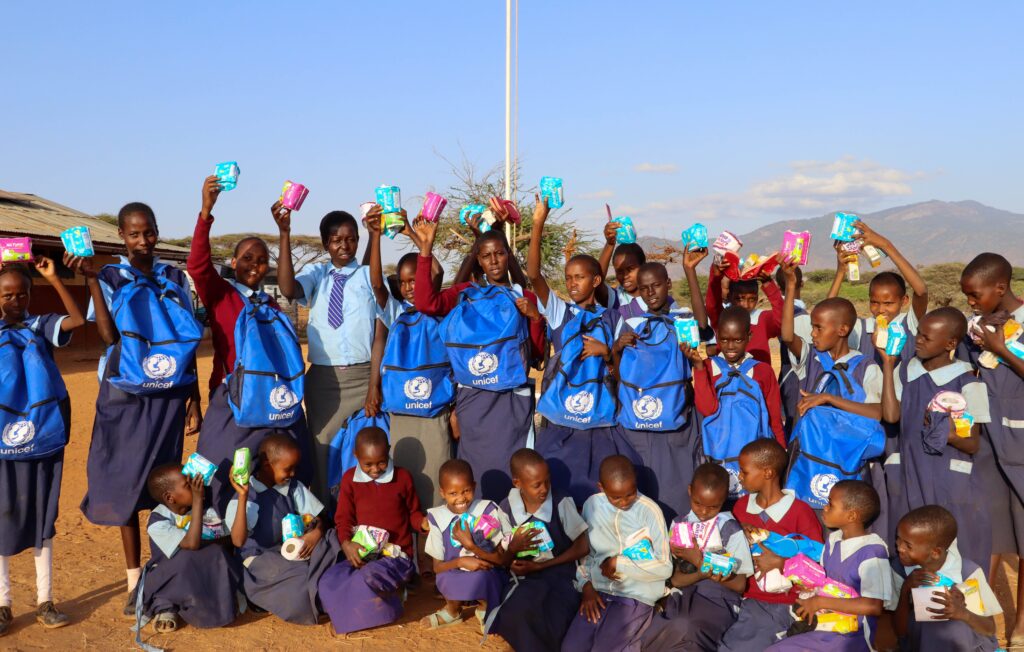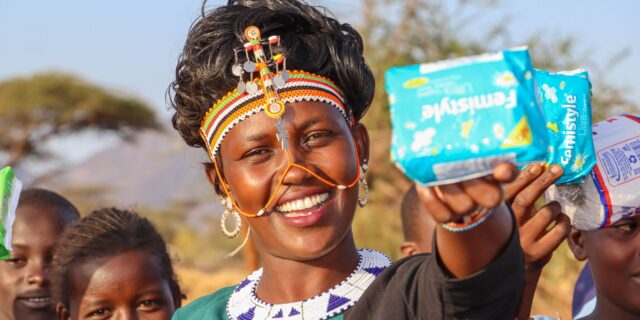Within the essence of Kenya’s rural landscapes, where poverty’s grip tightens its hold, the stories of countless young girls battling the challenges of menstrual hygiene management are often unheard, hidden behind closed doors and stained bed sheets. For millions of girls from impoverished families across the country, the transition to womanhood becomes not just a personal journey but a trial against societal barriers and resource scarcities.
Lkisin Primary School, nestled in the rural outskirts, provides a glimpse into the struggles faced by these girls. Selina, a dedicated teacher and patron at Lkisin Primary, sheds light on their dire circumstances. “We’ve been relying on CBOs like Pastoralist Child Foundation to provide sanitary towels for our girls ,” she shares. Selina’s commitment to her students is palpable. Her handbag always carries a stash of sanitary towels for emergencies, a lifeline for the girls who lack access to proper menstrual hygiene products. “Being a patron at this rural school in Samburu,” she explains, “the girls have no access to proper sanitary towels, sometimes forcing them to miss school for three to five days during their periods.”
Sandra, a student at Lkisin Primary School, recounts the day she first encountered her period with a mix of innocence and uncertainty. “I was only 11 years old when I received my period,” she says, her voice carrying the weight of a memory long-held. “Nobody told me what to expect or do. In our school, we only had male teachers.” Sandra’s candid narrative reveals the lack of information and support that young girls face in these communities.
“I felt wet and rushed to the toilet. When I checked, there was blood all over. I thought something had cut me, but I wasn’t feeling any pain,” Sandra recalls. “I decided to go back to class, but during break time, I stood up, and I had dirtied my chair. My uniform was also stained.” Faced with an unexpected situation, Sandra improvised, using her school sweater and a piece of paper to salvage the situation. “I decided to stay back in class and not go to break,” she continues. As the day came to an end, she raced home, avoiding her friends, conjuring up excuses to shield her newfound secret.
Sandra’s story mirrors that of many young girls in rural areas. Poverty and the lack of proper menstrual hygiene resources compound the challenges they face. In resource-constrained households, proper dignity kits often become a luxury, and the consequences ripple through every aspect of their lives. The story of her stained chair and her makeshift solutions exemplifies the hardships faced by girls in communities where education about menstrual hygiene is a rarity.
Upon reaching home, Sandra resorted to using dirty clothes to manage her situation. “I put them in my underwear to stop the blood, but it didn’t work. The next day, I told my mother that I wasn’t feeling well, just so I could stay home. I never told her about my period until she saw my beddings.” Sandra’s account reflects the stigma and silence that surrounds menstruation in these communities. “We pastoralists sleep in hides and skins, and in the morning, we have to expose our beddings to the sun. My mother asked me about my period, and I didn’t lie. She said she felt bad because she could have told me about it earlier.” Sandra’s mother, like many mothers in these circumstances, regrets the lack of open conversation around this natural process.
In the absence of sanitary towels, Sandra’s mother improvised, providing her daughter with leaves and rags, tied carefully to provide some semblance of protection. “Because nobody knew about sanitary towels then,” Sandra adds. This revelation underscores the critical need for education and awareness, not just among the girls but within the community as a whole. “I stayed home the whole week without going to school,” she concludes, highlighting the grim consequences that inadequate menstrual hygiene resources can have on a girl’s education.
Sandra’s experience is emblematic of a systemic issue affecting countless girls across rural Kenya. The lack of proper menstrual hygiene management leads to girls missing school, dropping out, or facing embarrassment and shame. The cycle of poverty intertwines with the lack of access to menstrual hygiene products, creating a daunting barrier to progress.
The stories of girls like Sandra underscore the urgent need for comprehensive menstrual hygiene education and support in rural communities. The struggle they face is not just about managing their periods; it’s a battle for dignity, education, and a brighter future. As organizations and communities join hands to provide solutions, these young girls are finding their voices and asserting their right to proper menstrual health—a fundamental right that should never be compromised by poverty or societal taboos.



